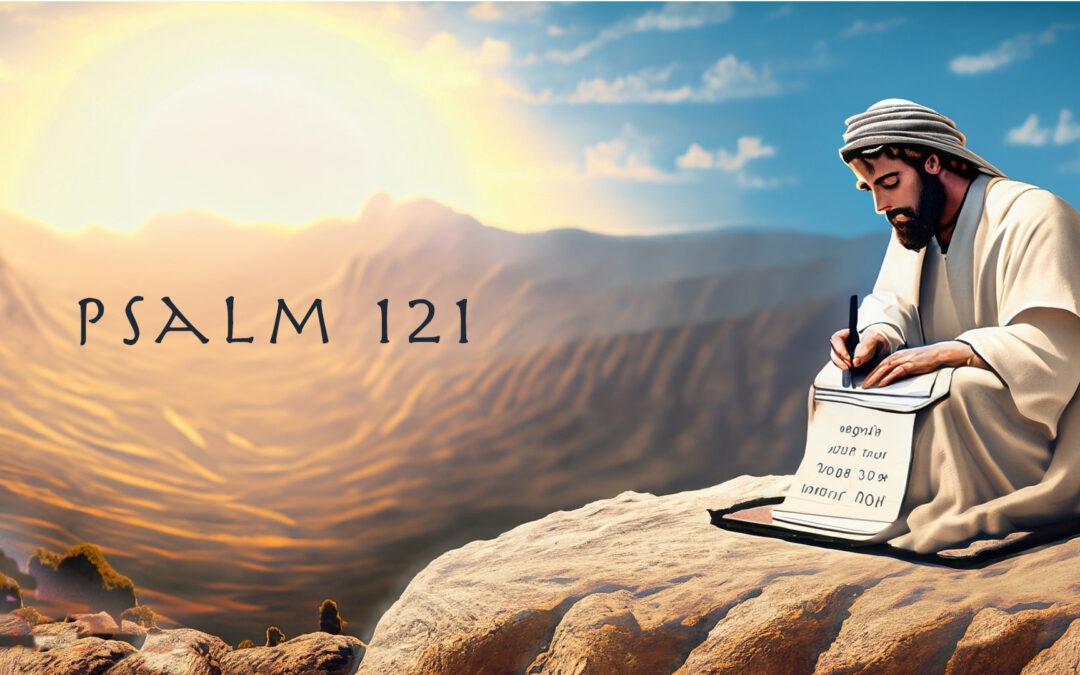
by Derek Packard | Jul 14, 2023 | bible, bible study
I love the Psalms. I love praying the Psalms. This short article serves as an exploration of Psa 121 and its Relevance for Christians Today.
Book of Psalms, replete with timeless wisdom and divine inspirations, holds enduring significance for Christians who take the time to read them.
One of the most profound psalms that continue to reverberate within the hearts of believers worldwide is Psalm 121. A song of ascents, Psalm 121 serves as a beacon of hope and assurance, reaffirming God’s ever-present help and protection. This article will delve into the essence of this psalm and expound on its application for Christians navigating the vicissitudes of life in the modern world.
Understanding Psalm 121
Psalm 121 NLT
I look up to the mountains— does my help come from there? My help comes from the Lord, who made heaven and earth! He will not let you stumble; the one who watches over you will not slumber. Indeed, he who watches over Israel never slumbers or sleeps. The Lord himself watches over you! The Lord stands beside you as your protective shade. The sun will not harm you by day, nor the moon at night. The Lord keeps you from all harm and watches over your life. The Lord keeps watch over you as you come and go, both now and forever.
Psalm 121 is a testament to divine providence, offering comforting assurances of God’s unyielding watchfulness over His children. Beginning with the rhetorically profound, “I lift up my eyes to the mountains—where does my help come from?”, the Psalmist establishes a spiritual paradigm. The answer follows suit, forming the cornerstone of our Christian belief, “My help comes from the Lord, the Maker of heaven and earth.”
Delving Deeper: God’s Protective Presence
Psalm 121 weaves an imagery of God’s ceaseless vigilance and His unfaltering role as a guardian. The lines “He will not let your foot slip—He who watches over you will not slumber” (v3) and “The Lord watches over you—the Lord is your shade at your right hand” (v5) paint a picture of a caring God whose vigilance transcends human understanding.
The Psalm reassures believers of God’s omnipresence in their lives. Whether it’s the harsh sunlight or the moon at night, symbolic of the hardships and fears that one might encounter, the Psalmist confirms, “The sun will not harm you by day, nor the moon by night” (v6). The Lord, as the Psalmist asserts, keeps us from all harm and watches over our life.
Contemporary Relevance
- Today’s world is fraught with uncertainties, trials, and tribulations. The pace of life and the multitude of pressures that accompany it can often lead to feelings of desolation and an overwhelming sense of helplessness. It is in these moments of despair that Psalm 121 offers profound comfort and hope to believers.
-
Source of Help: Psalm 121 begins by asking and answering one of life’s most critical questions – where does our help come from? In a world saturated with self-help ideologies and a culture that often promotes individualism, this Psalm draws Christians back to the fundamental source of help – God, the Maker of heaven and earth.
-
Assurance of Protection: In a world that feels increasingly insecure, Psalm 121 provides assurance of God’s continual protection. It tells us that God does not sleep or slumber but continually watches over us. This belief can encourage Christians in times of fear or insecurity.
-
Hope in Trials: The promise that “the sun will not harm you by day, nor the moon by night” (v6) becomes a metaphorical affirmation for Christians struggling with life’s hardships. No matter the adversities faced, this Psalm gives believers hope in God’s providence and protection.

Psalm 121 Conclusion:
In a time where uncertainties have become an everyday part of life, Psalm 121 emerges as an anthem of hope and reliance on God’s unending care. It serves as a spiritual compass for Christians, guiding them back to the basic truth of God’s sovereignty and constant watchfulness. It is an invitation to all believers to shift their focus from the trials and tribulations of this world to the unshakeable certainty of God’s eternal assurance. This enduring message makes Psalm 121 as applicable and comforting to Christians today as it was to the Psalmist millennia ago.
Pray and see how the Lord opens up Psalm 121 to you!

by Derek Packard | Jan 22, 2018 | bible study, house of prayer, How to Pray Tabernacle Prayer
The Packard family began praying the Tabernacle or Temple Prayer in 2002. Here Derek Packard explains the impact Tabernacle prayer has had on his family. This is a great video for those wondering “Why pray the tabernacle prayer?” and “What is so special about this form of prayer?”.

by Derek Packard | Aug 26, 2013 | bible study, How to Pray Tabernacle Prayer
The Bible is the best prayer guide
My kids used to ask me, “Dad, why do you pray so many bible verses outloud?” It seems many people who consider praying the Word at some point wonder why they should do it. On one hand it seems kind of foolish, praying the words God wrote back to Him. Are we so dull that we cannot come up with meaningful prayers ourselves? I told my kids at the time that when you pray alot you run out of your own words and besides God’s words are ALIVE ! They are the most powerful words anyone can ask to come to pass. And since I want God’s promises to come alive in our family I declare His Words outloud.
The Bible is full of people praying that way, quoting other Scriptures. By watching me, my kids are learning how to pray the Word as well. While talking to God about this the other day, I felt like the Lord let me in on a even better reason why praying the Word is so important. The revelation came through my son JD He’s two years old now and learning to talk up a storm. How does he learn to talk? The same way we all did, by making the same sounds his dad and mom make. He learns to speak to us by saying the things we say. As he experiences the world around him he sees us communicating with strange sounds and he begins copying us, “truck, cars, mom, dada, more” etc. From one word spurts he began putting two and three words together into phrases. The closer he gets to intelligible words the more we understand and answer his requests. Things move especially fast when he really wants something so he is very motivated to learn how to say it so we understand and give it to him. It’s the same with us and God. The best way to learn to communicate with God is by saying things His way. He wants us to learn a new language. He wants to teach us a new way of thinking. So he gives us a whole new vocabulary and a new way of thinking. This gift is in his words to us. As we learn to declare his words appropriately, a new bond of communication between us and Him develops. The more we do it, the better it gets, and we sense our relationship with the Lord becoming stronger and more passionate . We forget that we are really babes and one of the signs of growing up in spiritual maturity is how much we believe God’s words. My experience tells me there is a strong connection between praying God’s words and believing Gods words.
Jesus Christ is the Word
So much of our bible teaching today looks at God’s words as literature, or history. While all that is fine and good, it diffuses the true nature of God’s word.
Let us not forget that Jesus Christ literally is the Word.
Joh 1:1 IN THE beginning [before all time] was the Word (Christ), and the Word was with God, and the Word was God Himself.
Joh 1:14 And the Word (Christ) became flesh (human, incarnate) and tabernacled (fixed His tent of flesh, lived awhile) among us; and we [actually] saw His glory (His honor, His majesty), such glory as an only begotten son receives from his father, full of grace (favor, loving-kindness) and truth. [Isa. 40:5.]
So praying the Word is praying Jesus Christ into our mind and into the atmosphere surrounding any situation. My wife points out that children learn to say words before they really understand the meaning of them. It’s the same with us in the Spirit realm. As we declare God’s truth even before we fully understand it, his Word begins to take effect. It’s as if the more we say it, the more we learn what it means.
Praying through the Tabernacle Prayer is based on praying through many powerful bible passages. I have come to believe that praying the Tabernacle is a powerful blessing because not only are you praying God’s word. But you are also praying according to his ordained pattern of worship. This pattern is fulfilled in Jesus Christ. His body is the Temple. And we are part of that body. How do you feel about praying according to a clear order of worship? Do you think there are patterns of worship in the Bible? DP




